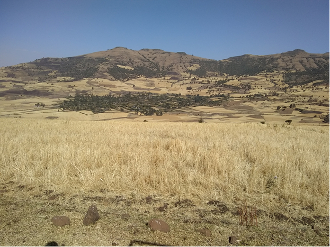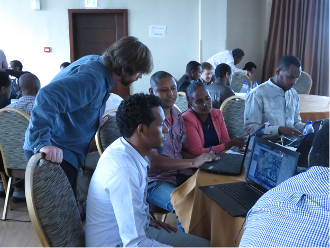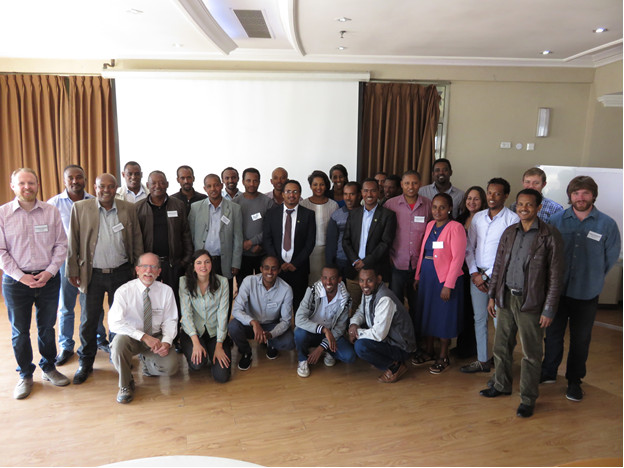 Ethiopia set ambitious sustainable development goals for its rapidly-growing economy under the Climate Resilient Green Economy (CRGE) strategy. In this plan, the government set the goals of increasing per capita income of citizens to middle-income levels by 2025 and transforming to an industrialized nation without increasing current levels of greenhouse gas emissions. The CRGE strategy makes the country a leader in Africa in low emission and climate resilient development. Ethiopia is implementing agricultural and forestry projects with conservation goals that include reduction of greenhouse gas emissions. However, tools and training are needed to support the measurement, reporting, and verification of greenhouse gas reductions from these projects.
Ethiopia set ambitious sustainable development goals for its rapidly-growing economy under the Climate Resilient Green Economy (CRGE) strategy. In this plan, the government set the goals of increasing per capita income of citizens to middle-income levels by 2025 and transforming to an industrialized nation without increasing current levels of greenhouse gas emissions. The CRGE strategy makes the country a leader in Africa in low emission and climate resilient development. Ethiopia is implementing agricultural and forestry projects with conservation goals that include reduction of greenhouse gas emissions. However, tools and training are needed to support the measurement, reporting, and verification of greenhouse gas reductions from these projects.
The goal of this project was to train practitioners working on land management projects to track, estimate and report carbon and greenhouse gas impacts of projects. The U.S. Forest Service International Programs in partnership with the U.S. Agency for International Development and Colorado State University hosted two, one-week workshops in Addis Ababa, Ethiopia.  The first workshop included a field trip to look at different agricultural systems and land-uses, and three days in the classroom. Participants were introduced to the foundations of greenhouse gas management and accounting, key international greenhouse gas policies, IPCC guidelines, and REDD+. In addition, participants received hands-on training with the Carbon Benefits Project (CBP) tool. This user-friendly online tool assists in the measuring, modeling, monitoring, and forecasting of carbon stock changes and greenhouse gas emissions from land management projects. Workshop participants then collected data relevant to their own projects between workshops and returned to Addis Ababa for a second week of training. The second workshop was focused on using project-specific data and generating and interpreting reports from the CBP to quantify the greenhouse gas benefits of participant’s projects.
The first workshop included a field trip to look at different agricultural systems and land-uses, and three days in the classroom. Participants were introduced to the foundations of greenhouse gas management and accounting, key international greenhouse gas policies, IPCC guidelines, and REDD+. In addition, participants received hands-on training with the Carbon Benefits Project (CBP) tool. This user-friendly online tool assists in the measuring, modeling, monitoring, and forecasting of carbon stock changes and greenhouse gas emissions from land management projects. Workshop participants then collected data relevant to their own projects between workshops and returned to Addis Ababa for a second week of training. The second workshop was focused on using project-specific data and generating and interpreting reports from the CBP to quantify the greenhouse gas benefits of participant’s projects.
Ethiopia’s CRGE strategy is well-respected nationally and internationally as a leading example of building economic resilience in the face of climate change. The vision is to create a robust economy that will be more resilient to climate change, improve air and water quality, and promote rural economic development. Through this training, participants will have the understanding and tools needed to accurately track and report the greenhouse gas impacts of land management activities in diverse regions and land use scenarios.

For more information on this project, contact Paul Evangelista at paul.evangelista@ColoState.EDU